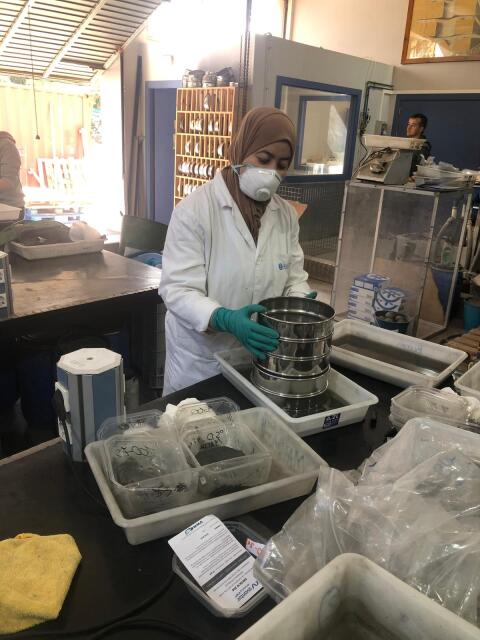METALLICO Young Researchers: Amina Eljoudiani
Recovering valuable raw materials, demonstrating sustainable production or developing innovative technologies: Many young researchers are doing their part to achieve the goals of the METALLICO project. They are highly motivated and passionate about their work. One of our "METALLICO Young Researchers" is Amina Eljoudiani. She is a PhD at Universitat Politècnica de Catalunya (UPC) . Currently, she is involved in the planning of technological strategies applied to highly complex polymetallic minerals, seeking to achieve their concentration assisted by technological characterization and gravity beneficiation techniques. Read more about Amina and her motivation.

Amina Eljoudiani, PhD at Universitat Politècnica de Catalunya (UPC).
What is your motivation and what excites you the most about your work?
The primary motivation for this endeavour is the contribution to the green transition through the sustainable utilisation of mineral resources. The aspect of the work that is the most exciting for me is the possibility of developing technological strategies that not only improve the recovery of valuable metals from complex polymetallic minerals, but also reduce Europe's dependency on external imports. I am particularly inspired by the balance between scientific innovation and societal impact: advancing mineral characterization and beneficiation techniques while also ensuring that processes are efficient, environmentally responsible, and scalable. The opportunity to participate in a collaborative European initiative such as Metallico is a significant motivator, driving the translation of research findings into practical applications that support resource security, sustainability, and industrial resilience.
Which impact do you think your research will have on the future?
I believe my research will contribute to making the recovery of critical and valuable metals from complex polymetallic minerals more sustainable and efficient. By advancing mineral characterization and gravity beneficiation techniques, I aim to help develop scalable processes that reduce environmental impact, strengthen Europe’s resource independence, and support the transition to a circular economy. In the future, I hope my work will not only advance scientific knowledge but also provide practical solutions for industry, ensuring that raw materials are sourced responsibly while fostering resilience and sustainability in the European value chain.
What opportunities does the research project METALLICO offer you as a young researcher in your early career?
The METALLICO project offers a unique opportunity to work at the intersection of cutting-edge research, sustainability, and industrial application. As a young researcher, this opportunity facilitates the development of advanced skills in mineral characterisation and beneficiation, whilst also enabling participation in an international, interdisciplinary network. The project provides access to cutting-edge technologies and facilitates knowledge exchange with leading experts in the field. Furthermore, it offers the opportunity to observe the direct societal and industrial impact of my work. This experience proved invaluable in shaping my career, endowing me with both scientific expertise and a broader perspective on the manner in which research supports Europe's green transition and resource independence.
What is the best thing about your job as a scientist in the METALLICO project?
The most beneficial aspect of my role as a scientist in the METALLICO project is the continuous learning opportunity it provides. Each experiment offers novel insights into the complexity of polymetallic minerals and encourages me to devise creative solutions. The collaborative nature of the project is also of significant value, facilitating the exchange of knowledge across various disciplines and cultures, thereby inspiring and rewarding the work. A curious aspect of my quotidian research endeavours pertains to the profound impact that seemingly negligible adjustments, such as modifying the angle of a shaker table or refining a sample preparation step, can exert on the eventual outcome. This serves to underscore the notion that, even within the domain of highly technical science, patience and curiosity frequently result in the most significant discoveries.
Find Amina on LinkedIn!
.jpeg)
Image source: Amina Eljoudiani
